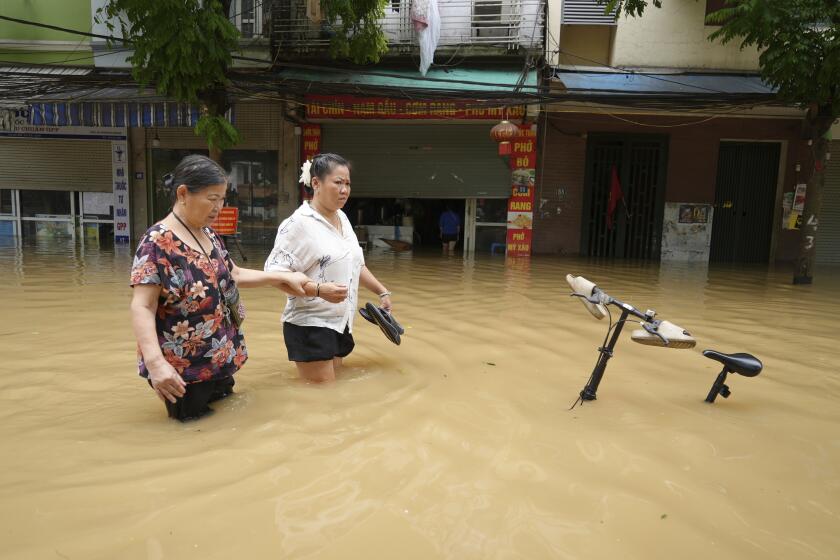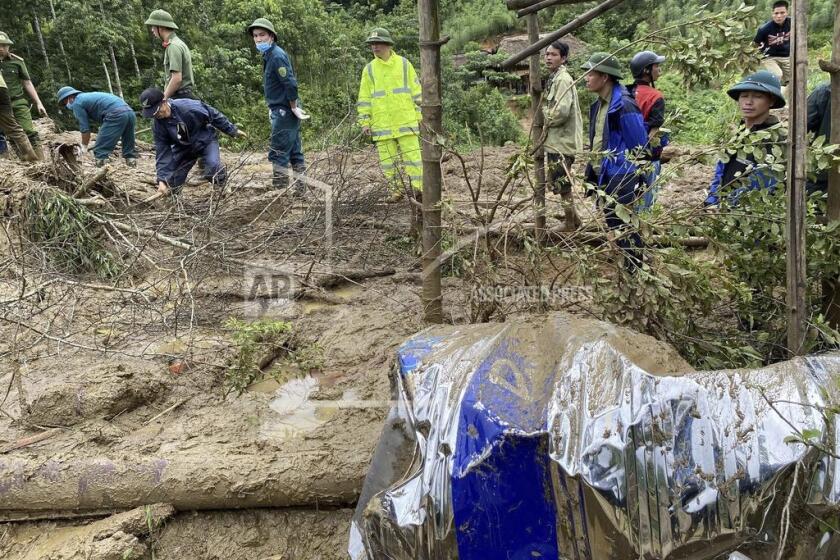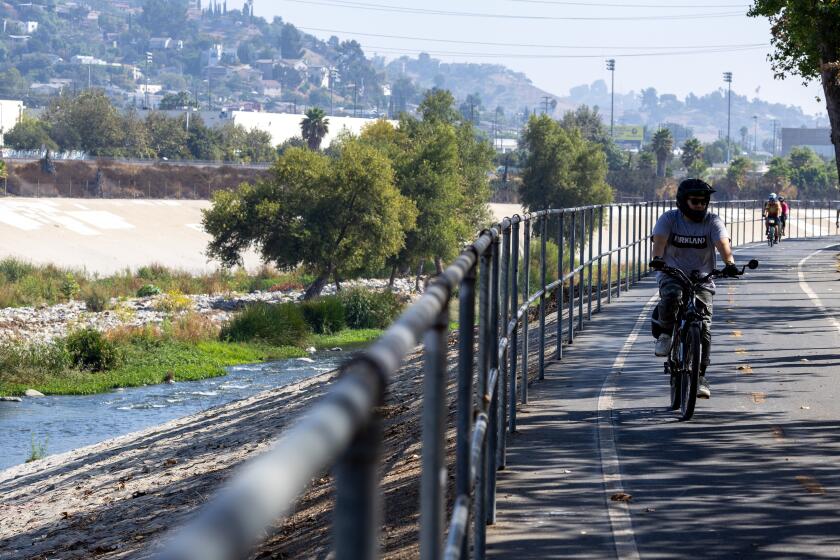Spain searches for bodies after unprecedented flooding claims at least 158 lives

- Share via
BARRIO DE LA TORRE, Spain — Crews searched for bodies in stranded cars and sodden buildings Thursday as people tried to salvage what they could from their ruined homes following devastating flash floods in Spain that claimed at least 158 lives, with 155 deaths confirmed in the eastern Valencia region alone.
More horrors emerged from the debris and ubiquitous layers of mud left by the walls of water that produced Spain’s deadliest natural disaster in living memory. The damage recalled the aftermath of a tsunami, with survivors mourning their loved ones.
Cars were piled on one another like fallen dominoes, uprooted trees, downed power lines and household items all mired in mud that covered streets in dozens of communities in Valencia, a region south of Barcelona on the Mediterranean coast.
An unknown number of people are still missing and more victims could be found.
“Unfortunately, there are dead people inside some vehicles,” Spain’s Transport Minister Oscar Puente said early Thursday before the death toll rose sharply from 95 late Wednesday night.
Rushing water turned narrow streets into death traps and spawned rivers that tore through homes and businesses, sweeping away cars, people and everything else in its path. The floods demolished bridges and left roads unrecognizable.
Rainstorms that started on Tuesday and continued overnight caused flooding in a wide swath of southern and eastern Spain, from Malaga to Valencia.
Luís Sánchez, a welder, was one of the lucky ones when the storm turned the V-31 highway south of Valencia city into a floating graveyard strewn with hundreds of vehicles. He said he saved several people.
“I saw bodies floating past. I called out, but nothing,” Sánchez said. “The firefighters took the elderly first, when they could get in. I am from nearby so I tried to help and rescue people. People were crying all over, they were trapped.”
Regional authorities said late Wednesday it seemed no one was left stranded on rooftops or in cars in need of rescue after helicopters saved some 70 people. The ground crews, however, were far from done.
“Our priority is to find the victims and the missing so we can help end the suffering of their families,” Spanish Prime Minister Pedro Sánchez said after meeting with regional officials and emergency services in Valencia on Thursday, the first of three official days of mourning.
Spain’s Mediterranean coast is used to autumn storms that can cause flooding, but this was the most powerful flash flood event in recent memory. Scientists link it to climate change, which is also behind increasingly high temperatures and droughts in Spain and the warming of the Mediterranean Sea.
Human-caused climate change has doubled the likelihood of a storm like this week’s deluge in Valencia, according to a rapid but partial analysis Thursday by World Weather Attribution, comprising dozens of international scientists who study global warming’s role in extreme weather.
A massive flood wave moving across Central Europe is threatening new areas and raising concerns among residents and officials.
The greatest pain was concentrated in Paiporta, a community of 25,000 next to Valencia city where Mayor Maribel Albalat said Thursday that at least 62 people had perished.
Paiporta “never has floods; we never have this kind of problem. And we found a lot of elderly people in the town center,” Albalat told national broadcaster RTVE. “There were also a lot of people who came to get their cars out of their garages. ... It was a real trap.”
While the most suffering was inflicted on municipalities near the city of Valencia, the storms devastated huge swaths of the south and eastern coast of the Iberian peninsula. Two fatalities were confirmed in the neighboring Castilla La Mancha region and one in southern Andalusia.
The regional president for Castilla La Mancha, Emiliano García-Page, said that at least one Civil Guard police officer was among several missing people in the town of Letur.
Homes were left without water as far southwest as Malaga in Andalusia, where a high-speed train derailed Tuesday night, although none of the nearly 300 passengers were hurt.
Nearly 200 people have died in Vietnam in the aftermath of Typhoon Yagi and 128 are missing as flash floods and landslides take their toll.
Greenhouses and farms across southern Spain, known as Europe’s garden for its exported produce, were also ruined by heavy rains and flooding. The storms spawned a freak tornado in Valencia and a hail storm that punched holes in cars in Andalusia.
Heavy rains continued Thursday farther north as the Spanish weather agency issued alerts for several counties in Castellón, in the eastern Valencia region, and for Tarragona in Catalonia, as well as Cadiz in the southwest.
“This storm front is still with us,” the prime minister said. “Stay home and heed the official recommendation and you will help save lives.”
More than 1,000 soldiers from Spain’s emergency rescue units joined regional and local emergency workers in the search for bodies and survivors. The soldiers had recovered 22 bodies and rescued 110 people by Wednesday night.
“We are searching house by house,” Ángel Martínez, with a military emergency unit, told Spain’s national radio RNE from Utiel, where at least six people died.
Some 150,000 people in Valencia were without electricity Wednesday, but roughly half had power by Thursday, Spanish news agency EFE reported. An unknown number did not have running water and were relying on whatever bottled water they could find.
The region remained partly isolated with roads cut off and train lines interrupted, including the high-speed service to Madrid. Officials said that damaged line won’t be repaired for two to three weeks.
State broadcaster VTV said a torrent of water gushing down a mountain in Lao Cai province buried Lang Nu hamlet with 35 families in mud and debris.
A man wept as he showed a reporter from national broadcaster RTVE the shell of what was once the ground floor of his home in Catarroja, south of Valencia. It looked as though a bomb had detonated inside, obliterating furniture and belongings, and stripping the paint off some walls.
The chaos also prompted some to smash and grab goods. The National Police made 39 arrests on Wednesday for burglarizing stores in areas affected by the storms. The Civil Guard deployed officers to stop the burglarizing of homes, cars and shopping malls.
The violent weather event surprised regional government officials. Spain’s national weather service said it rained more in eight hours in the Valencian town of Chiva than it had in the preceding 20 months.
Yet the calm after gave time to question the official response.
The Valencia regional government is being criticized for not sending out flood warnings to people’s mobile phones until 8 p.m. on Tuesday, when the flooding had already started in some parts and well after the national weather agency had issued a red alert for heavy rains.
The Turia River in Valencia, Spain, was diverted for flood-control purposes. Now, the city has miles of parkland on the old riverbed. L.A. could do something similar.
Andreu Salom, mayor of the Valencian village of L’Alcudia, told RTVE that his town lost at least two residents, a daughter and her elderly mother who lived together, and that police were still searching for a missing truck driver.
He also complained that he and his townsfolk had no warning of the disaster that struck when the Magro River burst its banks on Tuesday evening.
“I myself was on my way to check the river level because I had no information,” Salom said. “I went with the local police but we had to turn back because a tsunami of water, mud, reeds and dirt was already entering the town.”
Mari Carmen Pérez said by phone from Barrio de la Torre, a suburb of Valencia city, that her phone buzzed with the flood warning after the rushing water had already forced open the front door and filled the first floor, forcing her family to flee upstairs.
“They didn’t have any idea of what was going on,” Pérez, a cleaner, said. “Everything is ruined. The people here, we have never seen anything like this.”
Valencia regional President Carlos Mazón defended his administration’s management of the crisis, saying, “All our supervisors followed the standard protocol.”
Saiz, Wilson and Medrano write for the Associated Press and reported from Barrio de la Torre, Barcelona and Madrid, respectively. AP writer Seth Borenstein in Washington contributed to this report.
More to Read
Sign up for Essential California
The most important California stories and recommendations in your inbox every morning.
You may occasionally receive promotional content from the Los Angeles Times.















